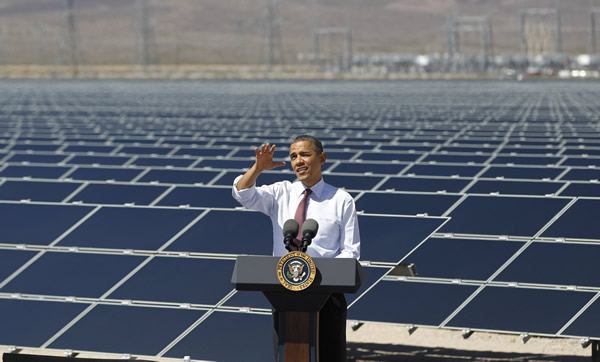
The Heritage Foundation has been making the case against energy subsidies for years. This research eventually led to a letter written in March 2011 by our sister organization, Heritage Action for America, and signed by numerous other organizations calling for the dismantling of energy subsidies.
Up until then, both Republicans and Democrats used the ever popular ?all-of-the-above? slogan to describe their energy policies, because they could make it mean pretty much anything they wanted. And more often than not, it meant to subsidize their politically preferred sources of energy.
While that policy position continues to exist (as we?ve seen with bipartisan, albeit shrinking, support to expand the wind production tax credit), it is no longer the status quo for energy policy. The work of the Heritage Foundation and other organizations, along with the fiscal cliff and the government?s demonstrated failures in selecting market-viable technologies and companies, has helped reverse this alarming trend in energy policy. Though the work is clearly not done, The Heritage Foundation?s vision of needing less?not more?government involvement in the energy economy is taking hold.
The latest example of the policy winds shifting was in a conversation on energy between Representative Fred Upton (R?MI) and businessman Mike O?Brien, where Upton said:
We don?t need subsidies like this, particularly when the taxpayer loses every dime in their pocket. So I am for putting all of these on the table. Let?s look at the oil and gas subsidies, let?s take them away. Let?s let them compete just like everyone else. The wind and renewable industry?they received some $90 billion in subsidies. Let?s talk about taking those subsidies away.
O?Brien replied, ?We invest heavily in oil, gas, coal and nuclear to this day, and if the congressman is now saying publicly that he?d like to end all those subsidies, then I congratulate him and I look forward to that vote.?
Earlier this year, Senators Jim DeMint (R?SC) and Mike Lee (R?UT) introduced legislation that would move the U.S. a giant step forward in making our country?s energy market more free by eliminating targeted tax credits for energy sources and technologies.
Their legislation, a companion to Representative Mike Pompeo?s (R?KS) bill in the House, would force any tax policy that picks certain industries as winners and losers in the market to expire at the end of the year and expedite sunsets for tax credits extending multiple years. And it goes after all targeted tax credits: oil (the actual oil targeted tax credits), renewables, nuclear, alternative fuels and vehicles, and advanced coal and gasification.
And since eliminating these economically unsound tax credits would raise revenue and thus be a tax increase, the bill would offset that increase by lowering the corporate tax rate permanently.
Governor Romney echoed this sentiment of using the tax code to pick winners and losers by calling for the wind production tax credit (PTC) to expire at the end of this year, while President Obama wants to see the PTC extended. As Representative Pompeo says, ?Wind companies and their lobbyists have, for the last year, been telling all who would listen that the expiration of the tax credit could spell doom for their industry. Obama repeats this claim regularly. But what does that say about the industry? If you need a tax credit to compete, you are probably not that competitive.?
Those wind producers who do not depend on the tax credit will remain alive and well.
A large challenge to return our energy economy to a more market-oriented one is preventing new subsidies, like those offered to natural gas vehicles. This year, the Senate introduced the bipartisan NATGAS Act that provides a host of subsidies for producing and buying natural gas vehicles and refueling infrastructure.
Similar legislation was introduced in the House last year, but 22 members, recognizing this subsidy-laden approach as bad for both taxpayers and the economy, withdrew co-sponsorship and stopped any momentum the bill had. Natural gas vehicles can play a bigger role in the marketplace, but that?s a risk for venture capitalists to undertake, not the taxpayers.
Even T. Boone Pickens, who led the charge for the NATGAS Act, admitted that the subsidies are unnecessary, saying, ?You don?t have to have a tax credit; it?s going to happen.?
Energy subsidies come in many forms, and they hurt the long-term viability of a company by establishing a dependence on government rather than allowing that company to recognize its true costs. Congress should prohibit any new energy subsidies and remove the ones currently in place. The private sector is far better equipped to allocate resources and develop commercially viable technologies.
Source: http://blog.heritage.org/2012/10/10/changing-the-definition-of-all-of-the-above-energy-policy/
seal seal and heidi klum drew peterson untouchable herman cain south carolina palmetto rob lowe sanctum
কোন মন্তব্য নেই:
একটি মন্তব্য পোস্ট করুন